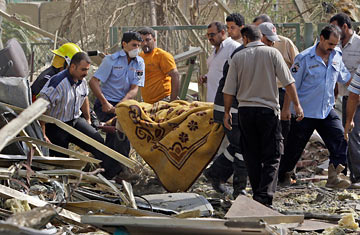
The body of a victim is carried from the blast scene after a suicide bombing in Baghdad
Was the goal of Sunday's twin car-bombings outside Baghdad's Green Zone to:
a) destabilize the government of Prime Minister Nouri al-Maliki?
b) undermine the Iraqi general election in January?
c) reignite the Shi'ite-Sunni sectarian war? or
d) kill a lot of Iraqis?
The correct answer, of course, is e) all of the above.
So far, however, the blasts have achieved only one of their goals — the death toll has passed 160. In every other respect, the attack will probably be irrelevant to the course of events in Iraq. While al-Qaeda and its affiliates have shown, yet again, that they retain the capacity to strike spectacular blows in the heart of Baghdad, such attacks are no longer game changers in Iraq. Here's why such attacks can't achieve most of the goals listed above:
a) The al-Maliki government, now in its final lap before the election, has never been especially stable: it has failed to deliver any significant improvement in basic services or create new jobs. Al-Maliki's effort to portray himself as a new strongman was floundering even before the recent spate of bombings. His hopes of retaining his position depend not so much on the security situation as on the vagaries of coalition politics. No party has the vote banks to win a majority on its own, so the next government will be yet another broad coalition with a weak, compromise figure at the head. Being perceived as a weakling was precisely the reason al-Maliki got the job four years ago, and it may yet work for him again.
b) If the January election is threatened, it is not by al-Qaeda's bombers but by Iraq's squabbling politicians, who have been unable to agree on crucial electoral legislation. Kurds and Arabs remain intractably divided on the future of the oil-rich city of Kirkuk, for instance, while the parties are unable to agree on whether they should be obliged to name the candidates on their electoral lists before the vote.
Should the politicians somehow scratch together a compromise allowing the election to take place, many Iraqis won't vote — but not because they're frightened of terrorist attacks. Security conditions were far worse for Iraq's two previous elections, but that didn't deter people from voting. Disillusionment with the political class is a more powerful factor that will keep people away from the polls. Many Iraqis are fed up with their elected leaders, and since the next election will be contested by the same cast of characters, it's a safe bet that turnout will be much lower than it was four years ago.
c) The only way al-Qaeda's bombers could alter Iraq's political landscape is if they can instigate a second sectarian war between the Shi'ites and Sunnis. It's clear that the recent series of bombings were intended to goad the Shi'ites into retaliating against Sunnis — just as they did in early 2006, after a long al-Qaeda bombing campaign culminated in the destruction of an important Shi'ite shrine in Samarra.
This summer, in a familiar pattern, bombers struck in Shi'ite neighborhoods across Baghdad. It's probably no coincidence that the government departments targeted on Sunday are known to be Shi'ite-dominated. There have also been attempts to bomb the giant shrine of Kadhamiyan, in Baghdad.
But the Shi'ites have thus far refrained from retaliating. One reason is that the community's main instrument of vengeance in '06 and '07 — Muqtada al-Sadr's Mahdi Army — has been tamed. Also, Shi'ites know that no amount of terrorist attacks is likely to change the arithmetic of democratic politics, which guarantees them, as the majority community, the lion's share of power in any government.
Will the Shi'ite resolve hold? Short of the destruction of another major religious site, it's hard to see them taking al-Qaeda's bait.
d) The brutal reality of Iraq is that the bombing campaign will continue, and more Iraqis will die. As al-Maliki pours additional security resources into protecting his capital, al-Qaeda will strike other, less-protected cities. While extremist groups continue to enjoy a safe haven in and around the northern city of Mosul, they will grow bolder. Al-Maliki will likely mount a major military offensive against them ahead of the election, hoping to score some political points.
Finally, some commentators read Sunday's blasts as an argument to alter the timetable of the U.S. military withdrawal from Iraq. It's unlikely that the attackers were sending a message to President Obama, but if they were, they've failed in that too. It is no longer in the White House's power to significantly alter the withdrawal timetable, which was set by the Status of Forces Agreement that the Bush Administration concluded with al-Maliki. Only an Iraqi government has the authority to ask U.S. forces to stay, but to do so would be political suicide, and that's not a course al-Maliki is likely to take. On the contrary, he has campaigned for re-election as the man who got the U.S. out.
